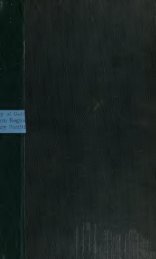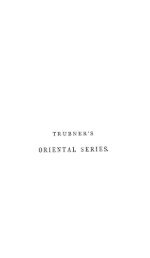Untitled
Untitled
Untitled
Create successful ePaper yourself
Turn your PDF publications into a flip-book with our unique Google optimized e-Paper software.
156<br />
v<br />
Abu 7<br />
N6TES ON THE FOURTH DISCOURSE<br />
Alf al-Husayn ibn |Abdu'llah ibn Sina (better known in the<br />
West bj the Europeanized form of his name Avicenna, and commonly<br />
,called in Persia, his native country, ash-Shavkhiifr-Ra'is, "the Ch'ief<br />
'<br />
Doctor," or al-Mu'allimu'th-Thani, "the Second Great Teacher")<br />
was born in August, A.D. qSo, in a village near Bukhara, where he<br />
received his earlier education, the philosopher an-Natili and the physician<br />
t'fsa ibn Yahya being *amongst his teachers. At the early age of ij<br />
he achieved medical renown by his successful treatment of the Samanid ,<br />
prince Nuh ibn Manstir (reigned A.D. 976-997). On his father's dea'th,<br />
when he was about 21 years of age, he went to Khwarazm, the circumstances<br />
of his departure fr&m which are described in Anecdote XXX V I.<br />
Attracted to Tabaristan by the fame of Qabiis ibn Washmgir, he arrived<br />
there, as he himself says 1<br />
, only to find that;<br />
*<br />
<<br />
that talented but unfortunate<br />
prince had been deposed and cast into prison, where he was soon afterwards<br />
murdered (403/1012-3). Avicenna subsequently became minister<br />
to Shamsu'd-Dawla at Hamadan, where he suffered disgrace and imprisonment,<br />
but presently escaped to Isfahan, and entered the service of^Ala'u'd-<br />
Dawla Abu Ja'far tytuhammad ibn Dushmanziyar of the so-called Kaka-<br />
wayhid dynasty 2<br />
, for whom he wrote his Persian Encyclopaedi/i of th^<br />
Sciences called in his honour Danish-nama-i^AlaH*. He died of colic<br />
on the march to Hamadan (where his tomb still exists) in 428/1037, at<br />
the age of 58 lunar years, after a short illness for which he treated himself<br />
with less than his usual success, so that it was said of him by a contem-<br />
porary satirist 4 :<br />
> *^j> $<br />
" I saw Ibn Sfnd (Avicenna) contending with men, but he died in prison (or,<br />
of constipation) the most ignoble death ;<br />
" What he attained by the Shifd (or, by healing) did not secure his health,,<br />
t nor did he escape death by his Najdt (or 'Deliverance')."<br />
In these verses there are three ingenious word-plays, for habs means<br />
both " imprisonment " and " constipation," while two of his most famous<br />
works are entitled Shifd (" Healing ") and Najdt (" Deliverance ").<br />
t Besides his medical and philosophical works, Avluenna wrote a good<br />
deal of fine poetry in Arabic and a few quatrains (s.ome of which are<br />
often ascribed to 'Umar-i-Khayyam) in Persian. The latter have been<br />
collected by the late Dr Hermann Ethe 5<br />
and of the former a consider-<br />
,<br />
6<br />
able number are given by Ibn Abi . Usaybi'a Of his beautiful Arabic<br />
qasida on the descent of the soul into the body a., translation will be<br />
found in vol. ii of my Literary History ofPersia 1 1<br />
(pp. o-i 1 Another<br />
1).<br />
1<br />
remarkable qasida ascribed to him foretells wit'n extraordinary prevision<br />
the Mongol invasion, the sack of Baghdad, the murder of the Caliph,<br />
1 Set the note on p. 79, 1. 23 of the text (Persian notes, pp. 250-251).<br />
2 See S. Lane-Poole's Mohammadan Dynasties, p. 145. n<br />
^ See Rieu's Persian Catalogue, pp. 433-434. A lithographed edition of this book<br />
was published at Haydarabad in the Deccan in 1309/18912.<br />
4 See Ibn Abi Usaybi'a's Tabaqdt, vol. ii, p. 6.<br />
5 Avicenna alspersischer Lyriker in the Gottinger Nachrichten for 1875, pp. 555-567.<br />
e 7 Vol. ii, pp. 10-18.<br />
Ibid., pp. 16-18.<br />
<<br />
*<br />
*<br />
'








![La religione di Zarathustra nella storia religiosa dell' Iran [microform]..](https://img.yumpu.com/15970820/1/151x260/la-religione-di-zarathustra-nella-storia-religiosa-dell-iran-microform.jpg?quality=85)


